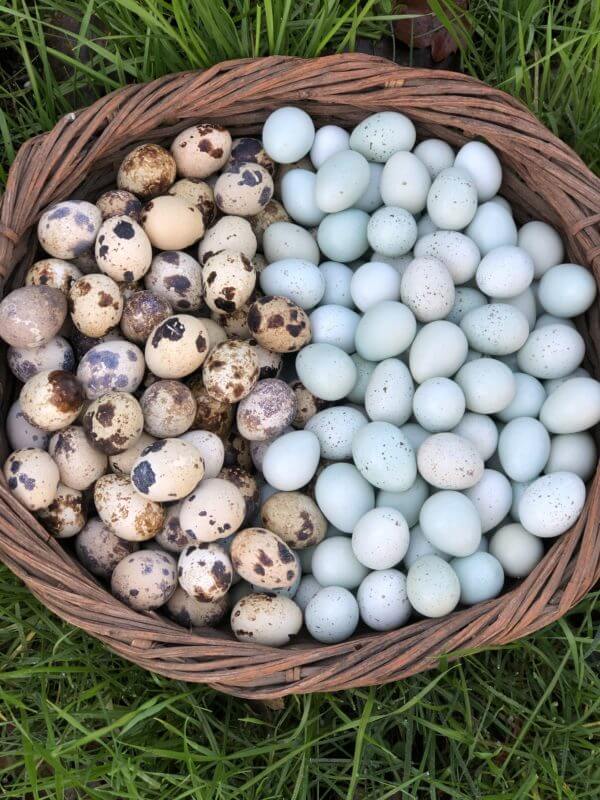Quail eggs are a treat. Whether served in a salad or eaten hard-boiled, they’re nutritious bite-sized food that everyone can enjoy, and they’re common in some parts of Asia, Europe, and North America. The Japanese prepare them hard-boiled in a traditional “bento” or lunch box, while the Chinese cook them into stuffed rice and steamed buns. And although they sound extremely appetizing, there’s more to quail eggs than meets the eye.
In this article, I am writing about a few things that will help you know more about Quail Eggs.

Interesting Things About Quail Eggs
You must be wondering why these tiny eggs are a viable alternative to chicken eggs, even if they can be a little more challenging to work with because of their size. But then again, a quail egg’s size makes it easy to consume.
Children who are struggling with eggs may find this particularly helpful. Now that we know the practical reasons for choosing quail eggs, let’s look at some facts that make the speckled eggs better than other options.
Let’s start with the source. Here are a few things you should know about quails:
- Quails are economical because they consume less space and eat less than chickens.
- Quails have a lifespan of 2 years, and chickens have a lifespan of 8 years.
- Quails lay at least one egg each day—which is a lot!
- Quails are quieter than chickens, so raising them is less bothersome in the neighborhood.
- Quail eggs have a thicker membrane than chicken eggs, making them harder to crack. But why bother cracking them when you can use a quail egg scissor?
Quail Eggs In A Protein-Rich Diet
If you’re looking into some diet plans, you may have encountered the hard-boiled egg diet. This diet gained popularity because of quick results, as fast as two weeks. The key to this diet is high-protein and low-calorie food, like lean meat, fish, and low-carb fruits and vegetables.
Quail eggs contain approximately 13% protein/100g, whereas chicken eggs contain 11%, making them ideal for a protein-rich diet. Some people may find a hardboiled chicken egg challenging to consume, but four quail eggs are easier to enjoy because of their size and faster preparation. It takes as little as 3 minutes to make a hard-boiled quail egg.
Quail eggs contain vitamins that make them ideal for weight management diet plans.
- Thiamin (B1) – These eggs are rich in B1, which helps convert carbohydrates into energy.
- Riboflavin (B2) is also present in quail eggs, allowing a smooth and fully functioning metabolism.
- Leucine – This amino acid helps with protein synthesis and supports the immune system.
Note: Although a hard-boiled diet has done well for some celebrities like Nicole Kidman, nutritionists don’t recommend restricting yourself to one food, which is why quail eggs, like chicken eggs, should be enjoyed as part of a balanced diet.
Detoxing With Quail Eggs
These tiny eggs are rich in vitamins A, C, E and antioxidants like beta-carotene. Here are some things you need to know about quail eggs and the detox process:
- The antioxidants in these eggs fight toxins and remove them from your body.
- The vitamin content helps flush toxins from the system.
Quail Eggs And Bone Health
Calcium is not the only way to strengthen your bones. Quail eggs contain vitamins that help build stronger bones, teeth, and nails.
- Lysine – This amino acid is crucial for bone strength, especially among children.
- Zinc – This mineral helps rejuvenate the skin, speeds healing and recovery, and promotes healthy growth among children.
- Potassium – This mineral helps prevent osteoporosis and reduce blood pressure.
Quail Eggs And Depression
Mental health is a crucial part of overall health, and consuming foods that have been shown to fight depression significantly affects the quality of life. After all, we are what we eat. Vitamin D, known to strengthen immunity and contribute to a good mood, is also present in quail eggs.
Quail Eggs May Help To Improve Cognitive Function
The rich amounts of vitamins and minerals in quail eggs improve cognitive functions and focus.
- Vitamin A helps to protect the brain from free radicals, allowing for better function.
- Vitamin B12 and choline are essential nutrients for the nervous system and help to maintain memory function.
Taste And Consistency
Quail eggs have a creamier texture than chicken eggs because they have a higher yolk to egg white ratio, making them perfect for fudgy, creamy, and dense desserts. The difference between quail and chicken eggs has more to do with consistency than taste.
Quail Egg Risks
Part of understanding the importance of these eggs is knowing that they may impose some risks to some people, and here are some things to note:
- People with high cholesterol levels should minimize egg intake since eggs, including quail eggs, are high in cholesterol.
- People with egg allergies should avoid all types of eggs, even these small ones.
Preparations
Great news! You can enjoy quail eggs like chicken eggs: hard-boiled, scrambled, or sunny-side up. You can add them to your salads and prepare them as healthy finger-food for parties, hearty meals, delicious desserts, diet recipes, and even smoothies.
Conclusion
Some people are still getting used to the idea of eating quail eggs. Still, as we adapt to more sustainable and healthy lifestyles, the concept of positive change in our overall nutrition becomes a strong possibility. And as we continue to educate ourselves about healthy alternatives, a quail egg boom may be around the corner.
